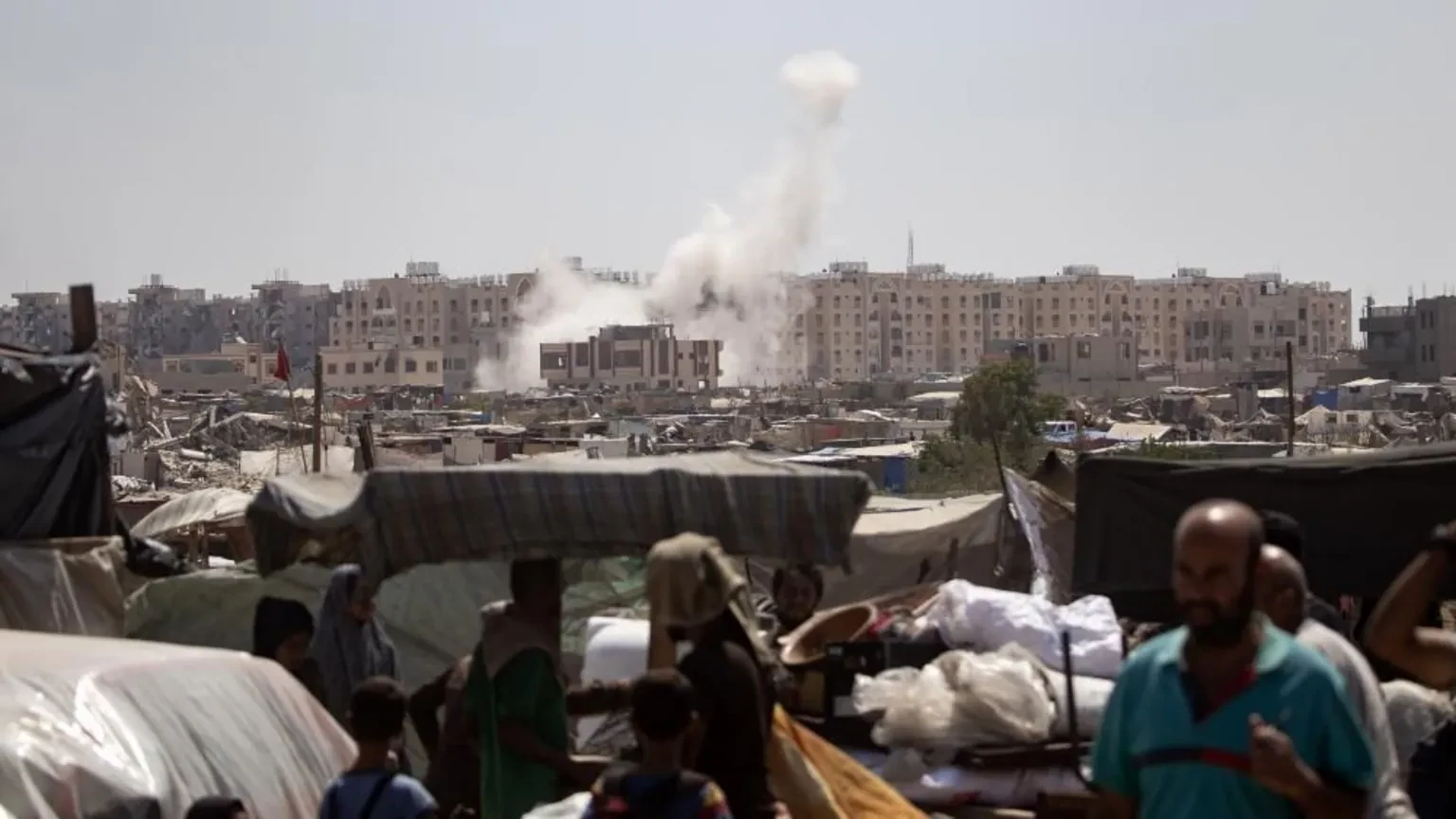October 7: A terrible day, a tragic year
 Getty Images
Getty Images
By Jérôme Fenoglio
At the beginning of this terrible year, there was an atrocious day. On October 7, 2023, the Hamas assault on the outskirts of the Gaza Strip not only unleashed the largest massacre of Israelis in the history of the state of Israel, murdering some 1,200 people, including 815 civilians. It is important to name what was committed that day: A deliberate act of extermination that nothing, no cause, no suffering, could justify in the eyes of any observer of good faith who repudiates the fact that a human being can be killed for who they are. On that Saturday, Jewish citizens of Israel found themselves, alongside other nationals, confronted with the weapons of a terrorist group, allied to another, the Lebanese Hezbollah, supported by a totalitarian military-religious regime, the Iranian mullahs, all of whom deny them the right of existing together in this part of the world.
On that day, Hamas further discredited itself by adding another war crime to its mass killings, tortures and rapes: The taking of more than 250 hostages, many of whom have since been killed, either by their captors or by bombs, and around a hundred of whom are still being held in the Gaza Strip, in conditions we wouldn't dare to imagine. A haunting torture for families, an unbearable blackmail for a nation.
This maddening day turned into a new, radicalized phase of the Israeli-Palestinian conflict from that very first evening. A tragic year in which self-defense carried out by the Israeli armed forces rapidly turned into vengeance that knows no boundaries. This through the determination of the head of government, Benjamin Netanyahu, who wanted to cover up the security disaster of October 7 as quickly as possible. In Gaza, realiation and the hunt for Hamas militiamen took the form of collective punishment against a population of two million, and the systematic destruction of their towns and infrastructure.
The death toll from these bombardments, which have left nothing but ruins, is now estimated at over 41,000, including thousands of children, by the Hamas-run Ministry of Health. And no argument – the imprecision and bias of the toll, the terrorists' tendency to hide among the population – can relativize the gravity of these civilian deaths for any person of good faith who adheres to the two founding principles of our democracies: A life is a life, all human beings are equal.
Most of these victims do not have a face, barely a name. Any independent investigation of these large-scale massacres has been made impossible by the Israeli army's ban on journalists entering Gaza. The West's silence surrounding these deaths is as scandalous as that which too often surrounded the accounts of the violence of October 7.
This unbridled vengeance, this refusal to cease fire, this avoidance of the norms that guarantee humanitarian law as much as possible in wartime, now exposes the Israeli democracy to the same prosecution before international justice as its enemy, Hamas, for war crimes and crimes against humanity. After 12 months of military operations, this shows the moral risk posed to a country that owes its existence to international law, by its strategy, which seems to seek to make an entire territory uninhabitable to drive the Palestinians out.
As a direct confrontation with Iran threatens to trigger a regional conflict, and as Lebanon, once again hard hit by an Israeli offensive against Hezbollah, is adding hundreds of civilian deaths and a million refugees to the overall toll of this crisis, Le Monde's planned coverage of the one-year anniversary of this fateful day, this tragic year and their geopolitical repercussions, reveals the extent to which international law has retreated, multilateralism has collapsed and the United Nations have been dramatically weakened.
Relentless investigation
Our coverage of breaking news, as well as of the recent past and the more ancient times of the conflict, has always been true to the two principles that have guided us since the creation, 80 years ago, of our newspaper, which is not much older than Israel. The unwavering defense of Israel's existence, rooted in an awareness of the Shoah and a resolute rejection of anti-Semitism, the breeding ground for all forms of racism and exclusion. The defense of the Palestinians' legitimate right to self-determination, leading to their own state. We are convinced that these two principles are not mutually exclusive; on the contrary, their joint recognition is the only possible way out of the never-ending crisis shaking both people.
For decades, this position has earned us criticism from both sides, who relentlessly accuse us of siding with the adversary. Lately, these criticisms have taken the form of campaigns, as virulent as they are caricatural, whose real aim is not so much to harm us as to put pressure on us to change our editorial commitment. Of course, it's all in vain. With complete independence, our expert journalists will continue to investigate the structures and strategies of Islamist movements that exploit the Palestinian cause to increase their influence or serve the interests of their leaders, as in the case of Lebanon's Shiite Hezbollah vis-à-vis the Tehran regime. In the same way, Hamas, locked in its fatal circle, is dramatically undermining the aspirations and fate of the people of Gaza.
But as the characterization of the dangers of religious fundamentalism cannot suffer from double standards, our correspondents and special envoys will not cease to describe in particular the messianic fanatics allied to the nationalist supremacists who form the spearhead of the ongoing colonization of the occupied West Bank.
Permanent state of war
Their most emblematic representative, Bezalel Smotrich, minister of the economy in the most right-wing government in Israel's history, viscerally opposed to any ceasefire in Gaza, not only defends the superiority of Torah over civil law. From his post, he organizes the territorial coup underway in the West Bank: What must be called large-scale theft of Palestinian land to make colonization irreversible. Through this ongoing violation of international agreements, Israel is continually placing itself outside the law. And this imprisonment of an entire nation to the extremist strategy of a fanatical minority has for too long hampered the chances of reaching a lasting compromise.
Indeed, one year after the massacres, the course of recent events is unlikely to deter Netanyahu from this law of the strongest. Held responsible for months for the failure of October 7, due to obvious errors of judgment, doomed to electoral defeat for failing to protect his fellow citizens, the head of government has recently seen his future brighten thanks to successes that are just as many of his opponents' mistakes. Hamas has been crushed, Hezbollah decapitated and Iran hobbled: This series of tactical successes has earned him renewed popularity, but it does not amount to a long-term strategy.
And without diminishing the great peril threatening Israel: Isolation. The post-October 7 period has shown how the world has changed, and how it increasingly perceives Israel as a country arrogating all rights to itself, with the automatic assent of Western powers. Netanyahu's relentless push is constantly alienating new sections of world opinion.
In the long term, this climate of general hostility is dangerous. Technological superiority is not eternal, even the most solid alliances can break, the short term does not build a future and no country can endure a permanent state of war. Momentarily victorious, Israel should listen to, rather than vilify, those who are sincerely concerned about its long-term survival. And they know that the position of strength in which the Jewish state finds itself these days is the best one in which to agree to compromises, the first gestures of appeasement that should lead to peace, the indispensable condition for a common future in the region.









Leave Comment